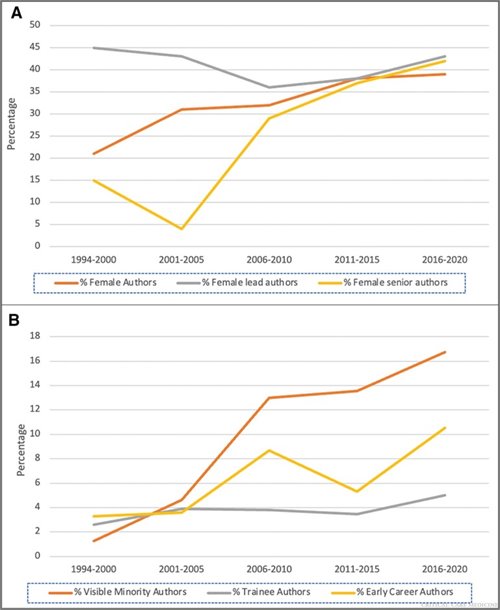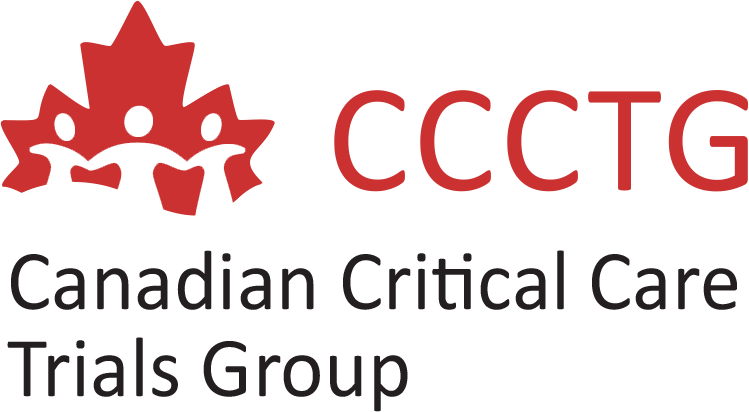Diversity of Authors of Publications from the Canadian Critical Care Trials Group
A feature article in the April 2022 issue of Critical Care Medicine looked at diversity of authorship in peer-reviewed articles published on behalf of the CCCTG. Led by CCCTG Equity, Diversity, and Inclusion Committee Chair Sangeeta Mehta, this quantitati
Findings at-a-glance
Mehta et al identified 4,246 authors from 354 eligible publications. Of those authors:
- 37% were women
- 13.7% were members of a visible minority group
Of all lead or senior authors:
- 40% and 34% respectively were women
- 15% (lead) and 10% (senior) were members of a visible minority group
Additionally:
- Three-quarters of publications listed authors from more than one profession
- More than half of listed authors were from more than one medical discipline
- Nearly half of publications listed authors who were early career faculty
- One third listed authors who were trainees
- Two thirds listed authors who were from visible minority groups
- Authors from different provinces and from different countries were listed in 67% and 40% of publications, respectively

Representation of women, visible minority, trainee, and early-career authors in Canadian Critical Care Trials Group publications. A, Percentage of female authors overall (orange line), female lead (first) authors (gray line), and female senior (last) authors (yellow line). B, Percentage of visible minority authors (orange line), trainee authors (gray line), and early career authors (yellow line). The number of publications during each time period is 20, 28, 52, 141, 113, for 1994–2000, 2001–2005, 2006–2010, 2011–2015, and 2016–2020, respectively.
This article’s authors emphasize the importance of systems for inviting authors to self-report their demographics - which the CCCTG is now implementing under Dr. Mehta’s leadership - and recommend the following strategies for research consortia:
- Diversity and inclusion policies
- A deliberate structure of academic collaboration
- Prospective collection of broad membership demographic data
- Celebration of visibility and intersectional innovation
- Emphasizing mentorship and promotion of underrepresented groups and individuals from developing countries when training the next generation of scientists
- Outreach to underrepresented community citizens’ groups
- Documenting diversity data in consortia publications, and
- Diversity, equity, inclusivity, and anti-racism training for all members
“By publicly sharing these CCCTG publication data, we hope to highlight the feasibility of interprofessional, interdisciplinary, interinstitutional, and international collaboration. We encourage other research consortia to measure and share their diversity data, to guide their steps and gauge their progress in advancing diversity.”
The accompanying editorial “applaud[s] the CCCTG for explicitly expressing the importance of inclusivity in critical care research” and “praise[s] Mehta et al for using their findings to compel the creation of a seven-point strategy to improve diversity in research consortia as well as self-reporting of author demographics.”
Building off of this progress, Dr. Mehta and colleagues identify 3 future directions for the CCCTG that will grow our diversity: Prospective collection of broad demographic variables for all members; increased Black, Indigenous, and underrepresented minority representation in our membership and citizens’ advisory groups; and increased patient/caregiver participation.
- Read the article: Diversity of Authors of Publications from the Canadian Critical Care Trials Group
- Read the editorial: Shining a Light on Diversity in Team Science
Mehta S, Ahluwalia N, Heybati K, Burns KEA, Owais S, Cook DJ; Canadian Critical Care Trials Group. Diversity of Authors of Publications From the Canadian Critical Care Trials Group. Crit Care Med. 2021 Aug 13. PMID: 34473658
Chen JT, Qadir N, Hope AA, Gershengorn HB. Shining a Light on Diversity in Team Science. Crit Care Med. 2022 Apr 1;50(4):685-687. doi: 10.1097/CCM.0000000000005292. PMID: 35311774.
